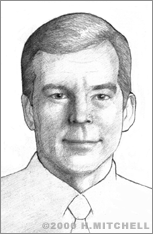Colin Twitchell
Colin S. Twitchell transformed his own love of outdoor activities into a distinguished career in the development of products that make such activities accessible to the physically challenged.
Growing up in New England, Twitchell displayed both enthusiasm and excellence in outdoor sports. His specialties were cross-country skiing and cycling, in both of which he had been a regional champion. But the young Twitchell had an active mind as well as an active lifestyle: by the time he was in high school, he had worked on designing both human-powered aircraft (1974-78) and customized wheels for road racing wheelchairs (1979).
Twitchell continued his work in universal design and adaptive technology at Hampshire College. To his already proven engineering instincts he added formal study of the needs and abilities of the body, earning a BA in Exercise Physiology and Mechanical Design in 1986. Twitchell's thesis project was the design of a multi-terrain wheelchair, with a lightweight but sturdy frame, knobby tires, and a small, trailing wheel for increased stability.
After graduating, Twitchell joined the Institute on Applied Technology at Boston Children's Hospital as an Adaptive Equipment Designer. Here, he designed wheelchairs and related equipment, as well as developing adaptive communication systems. Meanwhile, Twitchell also consulted in the design and construction of a wheelchair-accessible house, in his current hometown of Guilford, Vermont (1992).
The next year (1993), in Guilford, Twitchell founded Ergosport, Inc. At Ergosport, Twitchell made it possible for outpatient physical therapy to take place not in the hospital, but outdoors. At that time, canoeing and especially kayaking were enjoying a boom in popularity. Twitchell designed a manufactured D.I.Y. ("do it yourself") modular seating system, which persons without the full use of their legs could install, and then go canoeing or kayaking safely and conveniently, by themselves. Twitchell has in fact written the American Canoe Association's guide to seating adaptation.
In 1994, Twitchell returned to Hampshire College, as a faculty member. Twitchell founded, organized, and integrated the Hampshire College Lemelson Center, which now offers students a unique laboratory for the exploration of design and fabrication.
One of the Center's successes is the Accessible Snowboard, which was displayed at the Smithsonian's National Museum of American History in 1999-2000. Designed by two Hampshire students with Twitchell's help, the snowboard allows people to sit with their legs tucked under them on an elevated platform above the board itself. The snowboard was a logical progression from Twitchell's earlier work on sit-down skateboards and cross-country sit-skis.
In 1999, Twitchell served as mentor to the first annual Lemelson-MIT Invention Apprentice, Krysta Morlan. That summer, the two of them developed an invention of hers: a water-bike (like so many of Twitchell's own inventions) makes physical therapy a form of outdoor recreation. Today, Colin Twitchell is senior faculty associate of design and innovation for social change in the school for Interdisciplinary Arts at Hampshire College. As an inventor, engineer and instructor, he continues to provide remedial and recreational activities to those formerly cut off from the outdoors in collaboration with his students.


